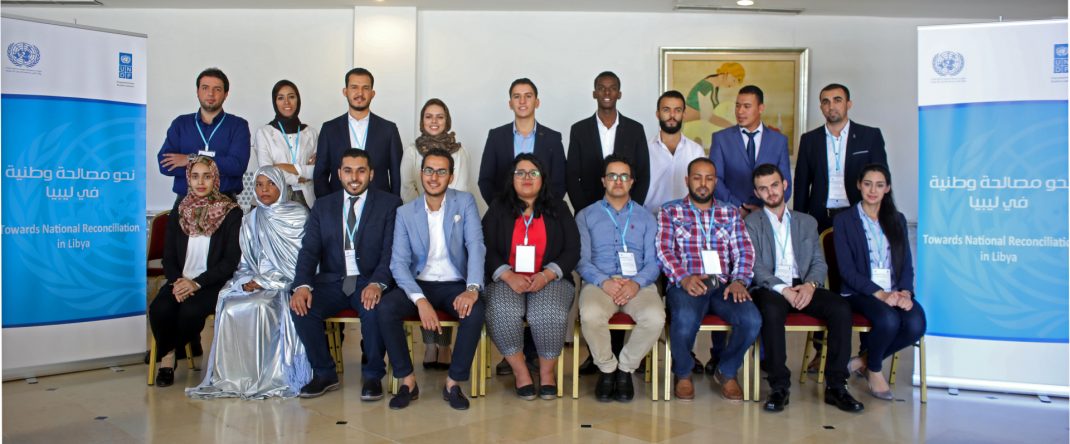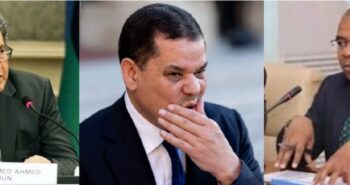Yusef Marda wasn’t naïve about the risks awaiting him when he set out on the long journey from his hometown of Kufra, deep in the Sahara Desert, to the nearest functioning civilian airport more than a thousand kilometres away.
He was headed to Tunis, to attend a youth reconciliation workshop. But to get there, he had to traverse unsafe territory.
Marda dispatched his valuables, a laptop and smartphone, ahead of him to avoid having them confiscated at one of the several checkpoints controlled by unaccountable militias along the way to the Mediterranean coastline city of Ajdabiya.
Once reunited with them on the coast, he hired a car and skirted the conflict zone of Benghazi to get to al-Bayda, and from there onwards to Labraq Airport and the flight to Tunisia.
“It was a tiring and dangerous journey, not just for me but for all those who need to travel and must traverse a region that’s an ethnic conflict zone,” Marda said. “Now that I’m here, I hope that we can emerge with shared priorities for peacemaking in Libya and see how we can help each other.”
Marda is one of the 30 participants from across Libyan society who came together in Tunis in a consultation run by the Libyan Dialogue and Debate Club (DDC), H2O and Sama with the support of UNSMIL and the UN Development Program, as part of a Peacebuilding Fund-supported project on national reconciliation in Libya.
“We’re discussing the problems contributing to the conflicts in Libya and looking towards the future positively so as to lay the ground for reconciliation,” said Mohamed Hammouda, the Tripoli-based founder of youth media group H2O and one of the event facilitators.
The meeting is part of preliminary consultations that will develop towards shaping an inclusive national reconciliation roadmap over multiple consultative sessions held with a representative cross-section of Libyan society.
The Tunis meeting follows other events in Tunis and Malta over the past ten months that brought together tribal leaders, members of civil society, academics, youth, minorities and women activists.
In March, a “technical advisory committee” of 20 Libyan experts, representing all aspects of society and a diversity of skills, was formed to accompany the United Nations throughout the implementation of the project and reinforce national ownership.
The youth consultation was preceded by a thematic consultation on internal displacement and how to address the issue within a national reconciliation framework.
“In Libya, social media is regionally split and results in your concluding that everyone on the ‘other side’ hates you, so the thing I enjoyed the most about the workshop was witnessing the reality of other Libyans,” said Mohamed Abusnaina, a Misrata-based civil society activist.
“I liked the cultural variety revealed when the walls came down, and to discuss honestly with the other cultural components of Libya what they really want.”
Youth represents nearly 50% of the Libyan population and was the driving force behind both the 2011 revolution and the ongoing clashes between militias and armed groups since then.
Convening them and supporting their mobilization has proven a demographic and democratic imperative in line with the UN Security Council’s Resolution 2250 which seeks to create a global policy framework by acknowledging how conflict impacts the lives of young people and affects their role in peace and security
In 2015, the UN Security Council passed Resolution 2250, acknowledging the role of youth in peace and security. The resolution creates a global policy framework to explore how conflict impacts young people’s lives and what must be done to mitigate its effects, as well as how youth can be meaningfully included in creating peaceful communities.
“It’s my deep belief that it will be young people who present us with solutions,” said Ahmad al-Twati, a civil society activist from Benghazi, “because they are the most affected by violence and also have a more optimistic outlook than their elders.”
“I enjoyed the constructive mentality of those attending who want reconciliation and accept each other,” said Faten Hassan, a member of the Tawareg community originally from Ghadames who is a member of Azjar, a community womens’ association.
Her group proposed the idea of introducing fellow Libyans to non-mainstream cultures and identities by organizing a traditional musical tour of the country that will be accompanied by debates on identity and citizenship.
Marda, the participant from Kufra, sees that, although many conflicts in Libya are rooted in historical and intercommunal grievances, his generation is already effecting some departures from tradition, such as being more mobile and less rooted in the land, an issue which forms the basis of many of the disputes that escalate into fighting.
“I hope that young people will play a great role in reconciliation in Libya, not just because they represent the majority but because they also have energies, creativity and solutions that the Libyan state must take into consideration,” said Inas Miloud, the Tripoli-based member of a group active with indigenous Libyan communities.
As he prepared to embark on the long way home, Marda said he hoped that “the relationships we built here help towards consolidating peace, whether in Kufra or elsewhere, so as to strengthen local relationships and realize a sense of security in the citizen.”
________________
Source: UN Mission in Liberia




